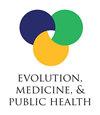Host-gut microbiota interactions during pregnancy
IF 2.1
3区 医学
Q2 EVOLUTIONARY BIOLOGY
引用次数: 0
Abstract
Mammalian pregnancy is characterized by a well-known suite of physiological changes that support fetal growth and development, thereby positively affecting both maternal and offspring fitness. However, mothers also experience trade-offs between current and future maternal reproductive success, and maternal responses to these trade-offs can result in mother-offspring fitness conflicts. Knowledge of the mechanisms through which these trade-offs operate, as well as the contexts in which they operate, is critical for understanding the evolution of reproduction. Historically, hormonal changes during pregnancy have been thought to play a pivotal role in these conflicts since they directly and indirectly influence maternal metabolism, immunity, fetal growth, and other aspects of offspring development. However, recent research suggests the gut microbiota may also play an important role. Here, we create a foundation for exploring this role by constructing a mechanistic model linking changes in maternal hormones, immunity, and metabolism during pregnancy to changes in the gut microbiota. We posit that marked changes in hormones alter maternal gut microbiome composition and function both directly and indirectly via impacts on the immune system. The gut microbiota then feeds back to influence maternal immunity and metabolism. We posit that these dynamics are likely to be involved in mediating maternal and offspring fitness as well as trade-offs in different aspects of maternal and offspring health and fitness during pregnancy. We also predict that the interactions we describe are likely to vary across populations in response to maternal environments. Moving forward, empirical studies that combine microbial functional data and maternal physiological data with health and fitness outcomes for both mothers and infants will allow us to test the evolutionary and fitness implications of the gestational microbiota, enriching our understanding of the ecology and evolution of reproductive physiology.孕期宿主与肠道微生物群的相互作用
哺乳动物妊娠期有一系列众所周知的生理变化,这些变化支持胎儿的生长和发育,从而对母体和后代的健康产生积极影响。然而,母体也会在当前和未来的生殖成功之间进行权衡,而母体对这些权衡的反应可能会导致母子健康冲突。了解这些权衡的运作机制及其运作环境,对于理解生殖的进化至关重要。一直以来,人们认为怀孕期间的激素变化在这些冲突中起着关键作用,因为它们直接或间接地影响着母体的新陈代谢、免疫力、胎儿生长以及后代发育的其他方面。然而,最近的研究表明,肠道微生物群也可能发挥重要作用。在此,我们构建了一个机理模型,将孕期母体激素、免疫力和新陈代谢的变化与肠道微生物群的变化联系起来,从而为探索这种作用奠定了基础。我们认为,激素的明显变化会直接或通过对免疫系统的影响间接改变母体肠道微生物群的组成和功能。然后,肠道微生物群会反馈影响母体的免疫和新陈代谢。我们认为,这些动态变化很可能参与调解母体和后代的健康状况,以及孕期母体和后代不同方面健康和健康状况的权衡。我们还预测,我们所描述的相互作用可能会因母体环境的不同而在不同种群间发生变化。展望未来,将微生物功能数据和母体生理数据与母婴健康和体能结果相结合的实证研究将使我们能够检验妊娠期微生物群对进化和体能的影响,丰富我们对生殖生理生态学和进化的理解。
本文章由计算机程序翻译,如有差异,请以英文原文为准。
求助全文
约1分钟内获得全文
求助全文
来源期刊

Evolution, Medicine, and Public Health
Environmental Science-Health, Toxicology and Mutagenesis
CiteScore
5.40
自引率
2.70%
发文量
37
审稿时长
8 weeks
期刊介绍:
About the Journal
Founded by Stephen Stearns in 2013, Evolution, Medicine, and Public Health is an open access journal that publishes original, rigorous applications of evolutionary science to issues in medicine and public health. It aims to connect evolutionary biology with the health sciences to produce insights that may reduce suffering and save lives. Because evolutionary biology is a basic science that reaches across many disciplines, this journal is open to contributions on a broad range of topics.
 求助内容:
求助内容: 应助结果提醒方式:
应助结果提醒方式:


